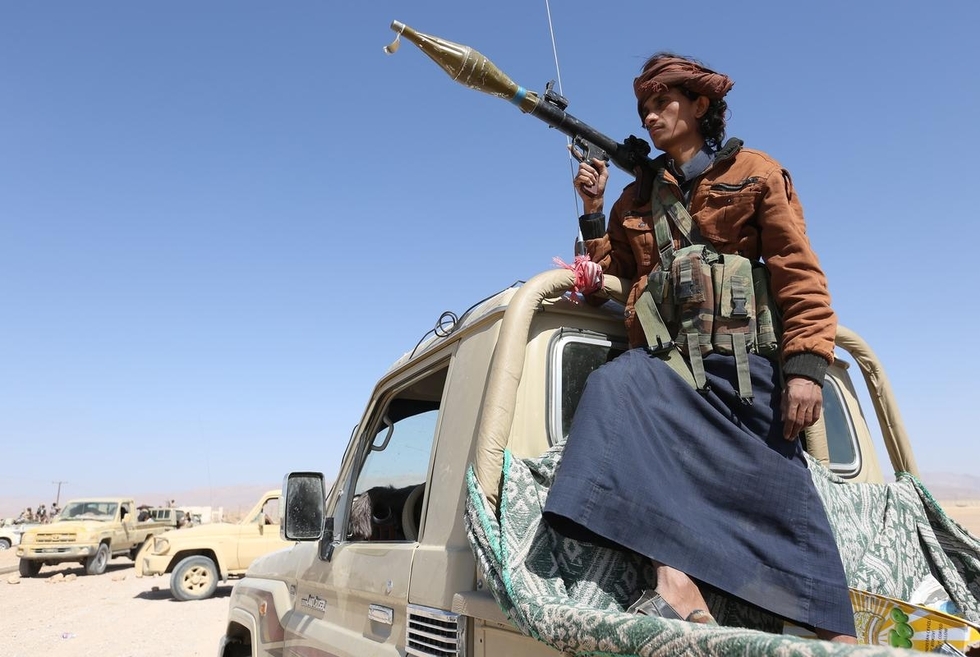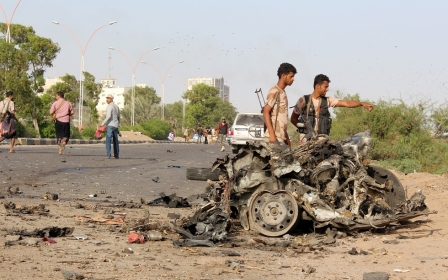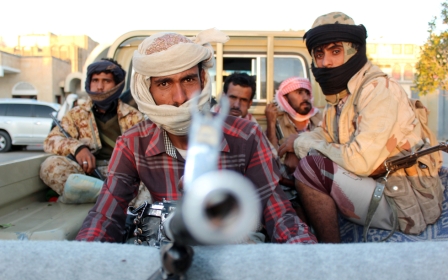Yemen's fire sale: How war turns civilians into arms dealers

TAIZ, Yemen - Adnan al-Qaatabi, 33, became an arms dealer after getting fired from working in a clothes shop in al-Turbah area in Taiz's al-Shimayateen district. Now he is doing a roaring trade selling Kalashnikovs to the Popular Resistance militia fighting the Houthis.
Although the arms trade is illegal in Yemen, since the war escalated in March 2015, the demand for weapons has soared and, in the face of rising unemployment and hunger caused by the conflict, Yemenis have started selling their personal weapons to armed groups.
"In June 2015, I was in need of money and decided to sell one of my two Kalashnikovs," Qaatabi told MEE. "Then I found its price to be around double and I knew that the Resistance buys different kinds of Kalashnikovs. This led me to work as an arms trader," he said.
Before the war, a Kalashnikov rifle sold for 170,000 Yemeni Riyals ($791) but now these weapons have skyrocketed to 300,000 Yemeni Riyals ($1,395). This was an indication for Qaatabi that many people will agree to sell their weapons.
"I can distinguish between the good and bad Kalashnikovs, and I started to buy weapons from the people in my village and sell them to fighters from the resistance, who come each Friday to al-Turbah market to buy the weapons," Qaatabi added.
Qaatabi has a shop in al-Turbah market, where he purchases weapons from residents and sells them bullets, which locals buy to fire on wedding days.
"This is a profitable profession and I can get 100,000 rials ($465) per week - while I used to get 60,000 ($280) per month in the clothes shop."
When the Houthis occupied Yemen's capital city of Sanaa at the end of 2014, and then began to attack other provinces, they had already seized huge quantities of weapons from the military camps in the Imran and Sanaa provinces.
In response, Sunni Yemenis and militas from several provinces formed the Popular Resistance to fight the Houthis with their personal weapons. Later, the Saudi-led coalition started to provide the resistance with higher-tech weapons and ammunition.
Recruits without weapons
However, the coalition's military support has not provided enough arms for the resistance in Taiz, and for this reason, the leadership of the resistance has decided to purchase Kalashnikovs from local residents, according to Moaath al-Yaseri, a leader in the Popular Resistance in Taiz province.
"The coalition provided us with 20 percent of the weapons, and most of the fighters are fighting with their personal Kalashnikovs, and there are more than 5,000 recruits without weapons yet, so we resorted to selling bullets and buying the Kalashnikovs from the residents," al-Yaseri told Middle East Eye.
He said that the coalition provided them with enough ammunition, but the resistance are in dire need of weapons to fight the well-armed Houthis. The resistance cannot bring weapons from other provinces since the Houthis have blocked every major transport route into the city.
"Usually the people in the rural areas have Kalashnikovs and pistols, so there are many arms traders buying weapons from residents in rural areas and selling them to us, while we sell bullets to these traders," al-Yaseri added.
Despite the Popular Resistance's tactic of purchasing firearms from local residents, thousands of fighters have not yet been issued a weapon, according to a Popular Resistence recruit, Amar Mubarak. Mubarak himself has not been provided a firearm.
"I am helping other fighters in inspecting the cars that come to the al-Misrakh area from the surrounding areas, and when I get a weapon I will join the battle of al-Dhabab as a fighter," Mubarak added.
Ahmed al-Ghaili, another arms trader in al-Turbah market, told MEE that he used to buy and sell weapons to residents secretly before the war. Now, he does not sell the weapons to locals - he only purchases them from locals and sells them to the Popular Resistance.
"The prices of Kalashnikovs and pistols have doubled and the residents will not pay expensive prices for weapons. For this reason I do not sell the weapons to locals, but we sell them bullets, which cost 200 rials (90 cents) for each one," he added.
Ghaili said many people come to him and sell their weapons from different areas around al-Turbah, as they think this is the best time to sell Kalashnikovs and pistols.
Selling weapons as a livelihood
Most Yemenis, especially residents of rural areas, have weapons and traditionally use them at weddings, but with the combination of unemployment and a high-demand for weapons, many have resorted to selling them.
Esam Ali, a resident in al-Mashbak village in Taiz's al-Shimayateen district, sold his Kalashnikov after he spent all the money he had.
"I am working as a building labourer, and there is not work nowadays, so I sold my Kalashnikov in October for 260,000 rials ($1,209) in order to provide a livelihood for my family," he told MEE.
He said he bought the Kalashnikov for his wedding 11 years ago for 100,000 rials ($465). It is customary that a groom must have a Kalashnikov at his wedding.
"If I did not have a Kalashnikov, I would die together with my wife and three girls from hunger, and the Kalashnikovs helped many families in our area to provide for their families - this is the best time to sell them," Ali added.
He said that the sum that he sold his Kalashnikov for is enough to provide for his family for six months.
Ali is just one of many who sold their weapons to eke out a livelihood for their families. Meanwhile, some people have bought huge quantities of bullets to use them later at weddings.
Hamdi Abu Bakr, a resident of al-Gihar village in the al-Shimayateen district, told MEE that he has bought 2,000 bullets to use at weddings.
"The weddings in our villages cannot happen without fire, and nowadays the bullets are cheap as each one costs YR200 (90 cents), and it used to cost 300 ($1.40), so I bought huge quantity to use them later at weddings, and also I can sell some of them later," he added.
According to reports, there are more than 60 million weapons in Yemen, including mortars and machine guns.
Ahmed Obaid, a retired officer, said that the Yemeni government should take advantage of the economic crisis and buy weapons from locals, and give these weapons to the defence and interior ministries.
Middle East Eye propose une couverture et une analyse indépendantes et incomparables du Moyen-Orient, de l’Afrique du Nord et d’autres régions du monde. Pour en savoir plus sur la reprise de ce contenu et les frais qui s’appliquent, veuillez remplir ce formulaire [en anglais]. Pour en savoir plus sur MEE, cliquez ici [en anglais].




